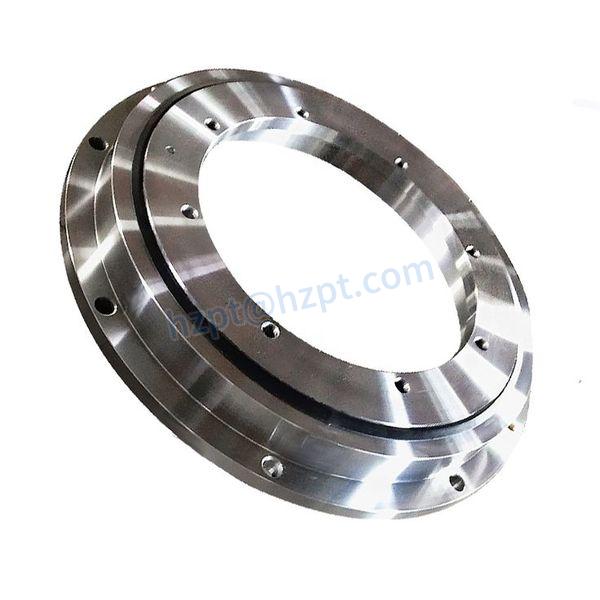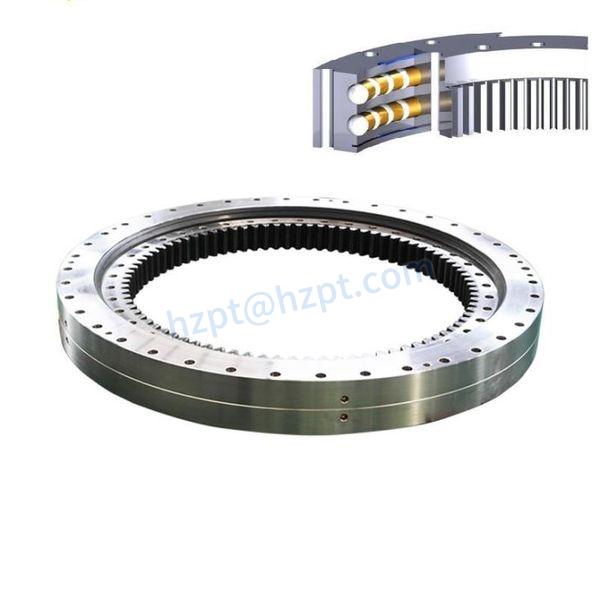Product Description
Product Description
Item No.: SS698-V-2RS
Type: Deep Groove Ball Bearing(max. completed ball bearings)
Material: Stainless Steel(AISI440C/9Cr18)
Bore diameter: 8mm Outer diameter : 19mm Width(Height/Thickness): 6mm
Size: 8*19*6mm
Closures: 2 Rubber seals(NBR)
Balls: Stainless Steel Balls
Lubrication: Lubricated with Mobil XHP-222 grease.
| Item No. | Bore diameter (mm) |
Outer diameter (mm) |
Width(Height/Thickness) (mm) |
Closures |
| SS698-V-2RS | 8 | 19 | 6 | 2 Rubber seals(NBR) |
Detailed Photos
SS698-V-2RS
Our Advantages
Compared with ordinary bearings, the stainless steel balls inside the full ball bearing connect the components to each other and also allow them to rotate freely between each other.Therefore, the bearing’s load capacity has been enhanced to meet the usage needs of large mechanical equipment. Make the overall bearing stable and improve the working efficiency of mechanical equipment. And it enhances wear resistance and can withstand high-strength wear and impact.
max. completed ball bearings:
Advantage:
1.Maintain a fixed distance between the arrangement of rolling elements in the bearing raceway.
2.Prevent running beads.
3.Avoid grinding between rolling elements.
4.Distribute the rolling element evenly along the circumference.
5.Reduce the adverse effects of bearing clearance movement during operation.
6.Strong load capacity, CZPT to adapt to the usage needs of large mechanical equipment.
7.Stable load-bearing, improving the efficiency of mechanical equipment.
8.Strong wear resistance, CZPT to withstand high-strength abrasion and impact.
Disadvantages:
1. High price: The production of full ball bearings requires a large amount of advanced materials and processing technology, so their prices are relatively high, and compared to other bearing types, their costs are higher.
2. Difficulty in installation and maintenance: Due to the fact that full ball bearings are a complex type of bearing, their installation and maintenance require highly skilled professionals, making them difficult to maintain and maintain.
Our company provides high-precision homemade bearing of ordinary material, including deep groove ball bearing and full complement cylindrical roller bearings.
The material refers to high-quality bearing steel, thermal treatment technology is put under strict control, and it is CZPT to carry out cryogenic treatment. And full complement cylindrical roller bearings adopts advanced roller CZPT for thermal treatment. Other technologies are all processed by full-automatic and semiautomatic equipment, and the production technology and quality control are arranged as per P5 precision. It products widely support home and abroad manufacturers of electric tools, mechanical equipment, automobile components, etc.
Manufacture Equipment
Company Profile
HangZhou WOLEE INDUSTRIAL CO.,LTD
HangZhou WOLEE induststial Co., Ltd. was founded in 2015. It is a professional company which engages in import and export of industrial components and is a professional production base with joint stocks.
The company mainly operates bearings and other industrial components such as chain, CZPT rail, gear and micro gearbox. Its products are widely used in the fields of metallurgy, mining, papermaking, petrochemical, power, railway, aviation, cement, textile, machinery, etc., it has lots of clients among these fields and has accumulated rich experience to meet different demands of all sectors. At present, its trade scale expands increasingly, its clients are all across the world, and it wins the trust of home and abroad clients by virtue of good reputation.
The company adheres to the tenet of “people first, quality first, credit first and reputation first” and provides each client with top service.
It heartily hopes to join hands with you to create a wonderful world.
/* January 22, 2571 19:08:37 */!function(){function s(e,r){var a,o={};try{e&&e.split(“,”).forEach(function(e,t){e&&(a=e.match(/(.*?):(.*)$/))&&1
| Aligning: | Non-Aligning Bearing |
|---|---|
| Separated: | Unseparated |
| Rows Number: | Single |
| Samples: |
US$ 10/Piece
1 Piece(Min.Order) | Order Sample |
|---|
.shipping-cost-tm .tm-status-off{background: none;padding:0;color: #1470cc}
|
Shipping Cost:
Estimated freight per unit. |
about shipping cost and estimated delivery time. |
|---|
| Payment Method: |
|
|---|---|
|
Initial Payment Full Payment |
| Currency: | US$ |
|---|
| Return&refunds: | You can apply for a refund up to 30 days after receipt of the products. |
|---|

What is the Typical Lifespan of Slewing Bearings under Different Operating Conditions?
The lifespan of slewing bearings can vary based on different operating conditions and factors that influence wear and fatigue. Here’s a general overview of the typical lifespan under various scenarios:
- Light Loads and Proper Lubrication:
When operating under light axial, radial, and moment loads and with consistent and proper lubrication, slewing bearings can often exceed 20,000 to 30,000 hours of service life.
- Heavy Loads and Harsh Environments:
In heavy-duty applications where the bearings handle substantial loads, such as construction equipment or mining machinery, the lifespan might range from 10,000 to 20,000 hours. Harsh environments with dust, moisture, and corrosive substances can affect the bearing’s durability.
- Corrosive Environments:
In environments with high levels of corrosion, such as marine applications, the lifespan of slewing bearings might be reduced due to the impact of corrosive elements on the bearing’s materials.
- High-Speed Applications:
In applications requiring high rotational speeds, such as certain automation systems or machinery, the bearing’s lifespan might be affected due to increased friction and wear associated with higher speeds.
- Poor Lubrication and Maintenance:
If proper lubrication and maintenance practices are neglected, the bearing’s lifespan can be significantly shortened. Insufficient lubrication leads to increased friction and wear, potentially reducing the lifespan by a considerable margin.
- Shock and Impact Loads:
Applications subject to frequent shock and impact loads, like certain material handling equipment, can experience premature wear and fatigue, leading to a reduced lifespan.
- Temperature Extremes:
Operating in extreme temperatures, whether high or low, can affect the performance of slewing bearings and potentially reduce their lifespan due to changes in material properties and lubrication effectiveness.
- Customization and Quality:
The quality of the bearing, manufacturing processes, and the extent of customization also play a role. High-quality bearings designed for specific applications might offer longer lifespans.
- Manufacturer’s Recommendations:
Always refer to the manufacturer’s guidelines and recommendations for the specific slewing bearing model. They provide valuable insights into maintenance intervals, lubrication, and expected service life.
It’s important to note that these are general estimates, and actual lifespans can vary depending on numerous factors. Regular maintenance, proper lubrication, adherence to guidelines, and consideration of operating conditions are essential for maximizing the lifespan of slewing bearings.

How does Proper Lubrication Impact the Performance and Longevity of Slewing Bearings?
Proper lubrication plays a crucial role in enhancing the performance and extending the longevity of slewing bearings. Here’s how it impacts these aspects:
- Reduced Friction and Wear:
Lubrication forms a protective layer between the rolling elements and raceways, reducing friction and wear. This minimizes surface contact and prevents metal-to-metal contact, leading to less wear and extended bearing life.
- Heat Dissipation:
Lubrication helps dissipate heat generated during operation. Adequate heat management prevents overheating, which can otherwise lead to premature bearing failure and reduced efficiency.
- Corrosion Protection:
Lubricants with anti-corrosion properties form a barrier that protects bearing surfaces from moisture and environmental contaminants. This is crucial in preventing rust and corrosion, especially in challenging operating environments.
- Sealing Effect:
Lubrication can enhance the sealing effect of bearing seals, preventing the ingress of dust, dirt, and other particles. This maintains the integrity of the bearing’s internal components and reduces the risk of contamination-related failures.
- Noise and Vibration Reduction:
Properly lubricated bearings generate less friction and operate more smoothly, resulting in reduced noise and vibration levels. This is particularly important in applications where noise reduction is essential.
- Improved Efficiency:
Effective lubrication minimizes energy losses due to friction, leading to improved overall efficiency of machinery. This is significant in applications that require high performance and energy savings.
- Prevention of Micro-Movements:
Lubrication helps prevent micro-movements between the rolling elements and raceways, reducing wear caused by repeated impacts and vibrations during operation.
- Maintenance Reduction:
Proper lubrication reduces the need for frequent maintenance and replacement of bearings. This not only saves time and resources but also contributes to increased uptime and reduced operational disruptions.
- Longevity:
By reducing wear, preventing corrosion, and managing heat, proper lubrication significantly extends the lifespan of slewing bearings. This, in turn, contributes to improved equipment reliability and reduced lifecycle costs.
In conclusion, proper lubrication is essential for optimizing the performance, efficiency, and durability of slewing bearings. Regular maintenance and adherence to manufacturer-recommended lubrication intervals ensure that the bearings operate smoothly and consistently over their operational life.

How do Different Types of Slewing Bearings Vary in Terms of Design and Function?
Different types of slewing bearings vary significantly in terms of their design and function, catering to diverse industrial requirements. Some common variations include:
- Single-Row Ball Slewing Bearings: These bearings consist of a single row of balls positioned between two rings. They are compact and suitable for light to moderate axial and radial loads, making them useful in applications like small cranes and excavators.
- Double-Row Ball Slewing Bearings: These bearings have two rows of balls and higher load-carrying capacity compared to single-row types. They find use in applications requiring higher loads and moment resistance, such as larger cranes and construction machinery.
- Three-Row Roller Slewing Bearings: These bearings use cylindrical rollers to handle heavy axial, radial, and moment loads. They are commonly found in heavy-duty applications like harbor cranes and mining equipment.
- Cross Roller Slewing Bearings: These bearings have cylindrical rollers arranged in a crossed pattern between the inner and outer rings. They offer high stiffness and precision, making them suitable for applications like robotic arms and precision machinery.
- Wire Race Slewing Bearings: These innovative bearings use a thin wire race to support the rolling elements. They are lightweight and compact, often used in medical equipment and aerospace applications.
- Ball-And-Roller Combination Slewing Bearings: These hybrid bearings combine ball and roller elements to achieve a balance between load capacity and precision. They find use in various industrial machines and equipment.
- Gearless Slewing Bearings: In some applications, slewing bearings incorporate no gears or teeth. They are used where external gear reduction is present or precise rotation isn’t required.
- Geared Slewing Bearings: These bearings include internal gears or teeth that allow torque transmission between the inner and outer rings. They are essential in applications requiring controlled rotation, such as cranes and wind turbines.
The choice of slewing bearing type depends on factors like load requirements, available space, rotational precision, and the specific industrial application. Understanding the variations helps engineers select the most suitable bearing for optimal performance.


editor by CX 2024-03-15
by
Tags:
Leave a Reply